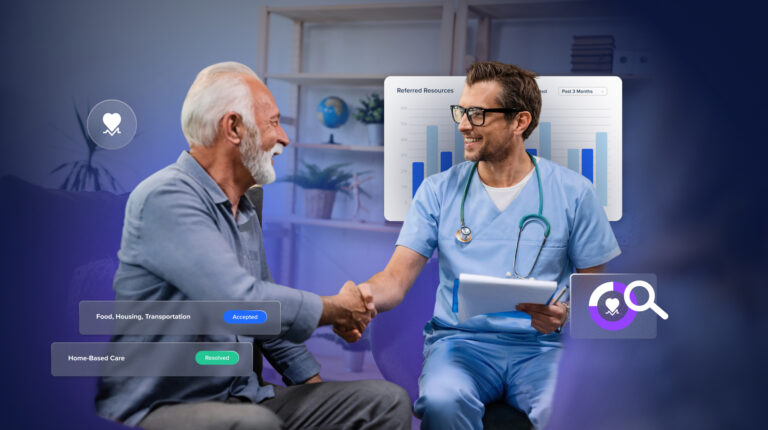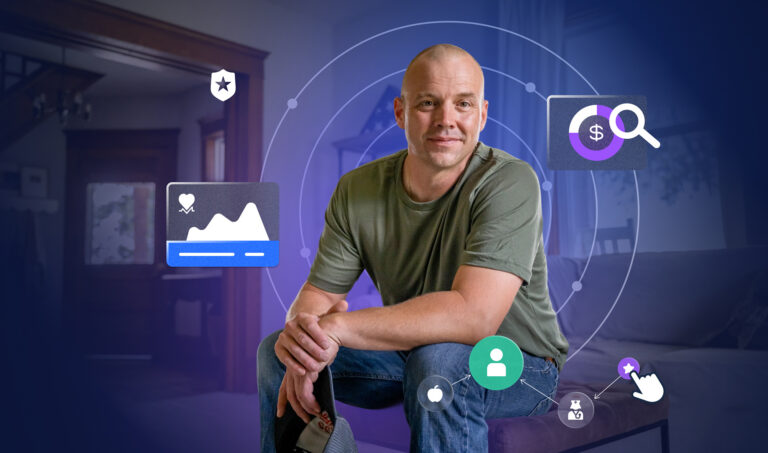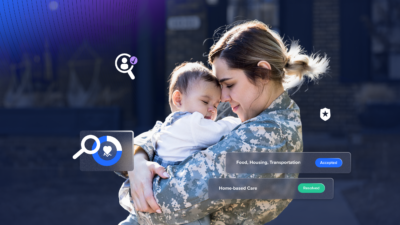
3 Actionable Insights for Advancing Veteran Health & Well-Being
By: Dr. Halima Ahmadi-Montecalvo, VP, Research & EvaluationIn 2024, 17.6 million men and women in the U.S. were Veterans, representing about seven percent of the adult population aged 18 and over. Veterans often encounter significant obstacles when transitioning back to civilian life, including undiagnosed mental health conditions, unmet social needs, and high risks of PTSD and suicide.
Since its founding more than a decade ago, Unite Us has launched a range of networks to address the needs of Veterans and military families. As a Veteran-founded organization, the Unite Us approach is centered around three key pillars:
- Assessing and understanding community needs to guide strategy;
- Coordinating service delivery by effectively engaging the affected individualstarget populations and partnering with local organizations to connect themindividuals to appropriate resources; and
- Facilitating billing and reimbursement processes for eligible services delivered by community providers.
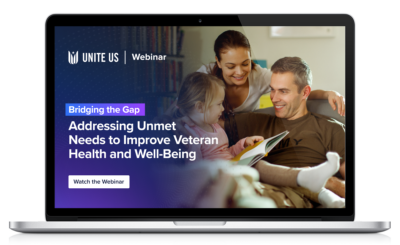 To date, over 295,000 cases have been referred on behalf of more than 112,000 military-affiliated individuals, the majority of whom are Veterans. Unite Us is proud to provide the technology infrastructure for various government agencies and community-based organizations (CBOs) supporting this population, but we recognize that there’s so much more work to be done.
To date, over 295,000 cases have been referred on behalf of more than 112,000 military-affiliated individuals, the majority of whom are Veterans. Unite Us is proud to provide the technology infrastructure for various government agencies and community-based organizations (CBOs) supporting this population, but we recognize that there’s so much more work to be done.
I had the privilege of moderating our recent webinar, “Bridging the Gap: Addressing Unmet Needs to Improve Veteran Health and Well-Being.” The discussion brought together experts in Veteran suicide prevention, caregiving, and the non-medical factors influencing Veteran health. The speakers to shared insights on current research, practical interventions, and strategies for enhancing Veteran well-being through cross-sector collaboration, and community engagement.
Meet the Speakers:

Dr. Marguerite Daus, PhD, RN is an Assistant Professor at the University of Colorado Anschutz Medical Campus, focusing on addressing workforce and system-level barriers to Social Determinants of Health (SDOH) programs for Veterans. She has extensive experience in understanding Veterans’ social needs during care transitions and implementing social needs screening and referral programs.

Lori Murphy is a senior social worker at the Central Ohio VA and a VHA Innovation Ecosystem Senior Innovation Fellow. She spearheaded the Compassionate Contact Corps, a volunteer phone call program to enhance Veteran social connectedness, and continues to lead non-clinical care innovation to improve connections to community services.

Dr. Kristen Vescera, a combat Veteran and former Psychological Operations Staff Sergeant in the U.S. Army Reserve, earned her PhD in clinical psychology from Palo Alto University in 2021, focusing on suicide and resilience in Service Members and Veterans. She is currently the Associate Director of Education at the VA Center of Excellence for Suicide Prevention in Canandaigua, NY, where she develops and evaluates national training programs and leads the Worried About a Veteran (WAV) communications initiative.
T A K E A W A Y 0 1
Social Isolation and Digital Access Needs are Critical Unmet Needs for Veterans
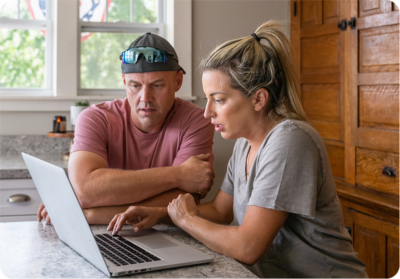 Social isolation and loneliness remain critical and unmet needs among Veterans, with significant implications for both mental and physical health. As highlighted by Dr. Daus, a recent VA survey found that 43% of Veterans reported digital access needs, including reliable internet, phones, or tablets. This lack of digital access can prevent Veterans from using telehealth and other digital resources, exacerbating experiences of social isolation.
Social isolation and loneliness remain critical and unmet needs among Veterans, with significant implications for both mental and physical health. As highlighted by Dr. Daus, a recent VA survey found that 43% of Veterans reported digital access needs, including reliable internet, phones, or tablets. This lack of digital access can prevent Veterans from using telehealth and other digital resources, exacerbating experiences of social isolation.
Navigating a complex web of services is another significant co-occurring—and often unmet—need. “Veterans are aware that there are programs out there that might benefit them, but they don’t know how to actually get to them,” said Lori Murphy.
This gap in service navigation further contributes to isolation, highlighting the need for organizations serving Veterans to create clear, accessible pathways to resources and support.
T A K E A W A Y 0 2
Family and Community Support are Cornerstones of Improving Veteran Health
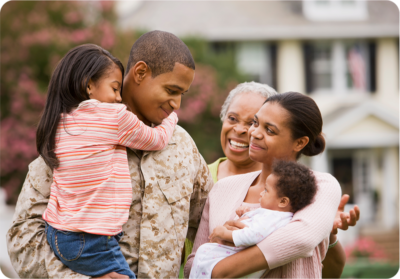 The role of family members and caregivers in supporting Veterans is critical. In recent years, there has been a significant shift in how healthcare and social services are approached, driven by the growing recognition that Veterans’ needs cannot be effectively met within siloed systems.
The role of family members and caregivers in supporting Veterans is critical. In recent years, there has been a significant shift in how healthcare and social services are approached, driven by the growing recognition that Veterans’ needs cannot be effectively met within siloed systems.
During the webinar, Lori Murphy highlighted the VA’s Caregiver Support Program, which offers resources to caregivers while acknowledging their multiple roles. This holistic approach helps caregivers better support Veterans in navigating their healthcare and social needs.
Dr. Kristen Vescera noted that, “The more we can educate ourselves as providers, family members, community members on the problem of suicide and the ways we can intervene from nationally recognized programs like these, the more prepared I think we can feel about talking about the difficult subjects like that.” Programs like Worried About a Veteran and gatekeeper trainings play a vital role in empowering loved ones and community members with the tools needed to effectively support Veterans.
T A K E A W A Y 0 3
Improving Veteran Care Starts with Successful Interventions and Policy Changes
 The webinar also highlighted several successful interventions and policy changes that are making a difference in Veteran care.
The webinar also highlighted several successful interventions and policy changes that are making a difference in Veteran care.
Dr. Daus discussed the VA’s ACORN program, which assesses non-medical needs and provides relevant resources to Veterans. “ACORN really is a two-component system where you have social risk factor screening that’s tailored to Veterans, and then the provision of relevant resources and referrals,” Dr. Daus explained. This program has screened thousands of Veterans, helping to identify and address their unmet social needs. Lori Murphy also emphasized the impact of the Compassionate Contact Corps, a volunteer-led phone call program that has expanded to over 120 facilities.
These initiatives, coupled with the growing recognition of the importance of social connectedness, are leading to better health outcomes and quality of life for Veterans.
Supporting Veteran Health with Technology Solutions
The insights shared by experts like Dr. Marguerite Daus, Lori Murphy, and Dr. Kristen Vescera underscores the critical role of social connectedness, digital access, and community support in improving the well-being of Veterans. By leveraging innovative technology solutions like those provided by Unite Us, we can effectively identify and address the complex and often unmet social needs of Veterans.
These technology-driven solutions not only streamline and track the referral process but also enable Veterans and their families to receive the comprehensive care they need. As we continue to innovate and collaborate, the future is bright when it comes to enhancing the lives of millions of Veterans in our country. Together, we can bridge the gap so that every Veteran receives the support they deserve.
